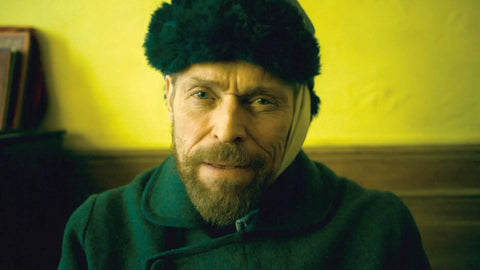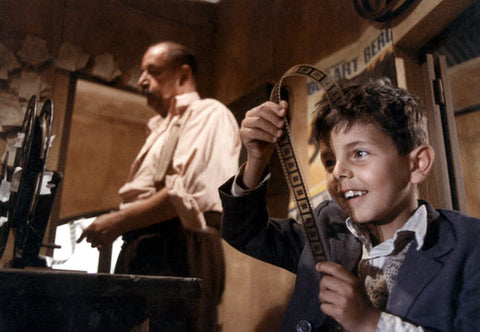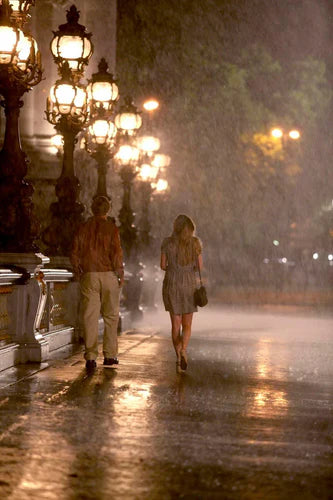
There’s a passage often shared online, attributed to Van Gogh:
"Inside everyone, there’s a fire. To the passers-by, it’s just smoke. But one person, just one, will see that fire, step closer, and sit with you. I bring with me my passion, my indifference, my rage, my gentleness, and my inexplicable faith in love, gasping for air as I go. And with trembling breath, I ask her: What’s your name? From her name, everything begins."
Last year, an animated film about Van Gogh came out, but I never watched it. The idea of mimicking his brushstrokes with computer effects and calling it cinema felt, to be honest, a little contrived. But a friend of mine, a painter, recently watched At Eternity’s Gate and said it moved her deeply. This time, I thought, I should give it a proper chance.
“You know, even Van Gogh’s paintings weren’t appreciated in his time,” she told me. “People thought he didn’t understand art, that his work was distorted, uglier than reality. Even the priest told him so.”
It was her words that nudged me towards the film. And it was worth it. We know Van Gogh for his vivid sunflowers, but what he saw were wilting blooms. Sitting before a decaying tree, he painted only its roots. Beneath a dark, endless sky, he envisioned brilliant blue. He saw beauty in worlds invisible to others.
Koreeda Hirokazu once said, “I don’t enjoy stories about heroes overcoming flaws, saving families, or rescuing the world. I’d rather capture the fleeting beauty of an ordinary, imperfect life.” I’ve been mulling over what fleeting beauty truly means. A reader once said they found beauty in my stories about everyday life, which touched me deeply. But Van Gogh’s work—his paintings are the essence of those fleeting, profound moments.
My painter friend told me the film broke her heart. Van Gogh, she said, was a man of extraordinary faith, more devout than the priest, more loving than any teacher, and gentler than a child. A man who painted such beauty yet lived so miserably, so alone.
And yet, after watching the film, I couldn’t help but wonder: if he had led a happy, untroubled life—untouched by the loneliness, pain, anger, and yearning that shaped him—would his art have expressed life’s endurance and hope with such clarity? Perhaps his struggles were the brushstrokes of his masterpiece.
Lately, a friend’s words have weighed on me. He’s someone I respect and trust. Two years ago, he once said my writing was chaotic, lacking focus. That critique stayed with me. When I started this blog, I didn’t even tell him. Recently, we found ourselves discussing writing again. I shared how a prospective employer had praised my work during an interview. He asked to read some of it, and when he did, his reaction was unchanged: “Your writing lacks polish. It’s disjointed, and you don’t even use idioms properly.”
He said, “Your work is full of gravel. If you sift it out, wouldn’t it be perfect?”
I cried that night—not because I couldn’t handle criticism; I’ve been critiqued my entire life. From the teacher who scolded me on my first day of school to the English instructor who threw my bag out of the classroom, to the relentless bosses who’ve found fault in me. No, I cried because it was him—someone whose opinion I held so dear—who said those words. It pained me that he couldn’t see what I saw in my writing. That he couldn’t understand how imperfection wasn’t a flaw but a part of the story.
Another friend, the painter, reassured me: “You’re vibrant, full of colour. Don’t let one person’s words convince you that you’re grey.” As an ordinary person, I know I’m far more fortunate than Van Gogh. Despite life’s trials, I have friends who believe in me more than I believe in myself. I’m not chasing brilliance; I’m simply trying to live in a way that reflects my own unique palette.
In one of his letters to his brother, Van Gogh wrote only the first line of that passage often misquoted: “There may be a great fire in our soul, yet no one ever comes to warm himself at it, and the passers-by see only a wisp of smoke.”
We all see the world differently. I tell myself to feel deeply, to keep writing what I believe in, and to leave the rest behind.
I light a match and take a drag of my cigar. Breathing in the warmth, I let go of a little sorrow with each exhale.
Here’s Anpu’s haunting Fireworks to accompany the thought:


